This video presents Climate Change 2014: Mitigation of Climate Change.
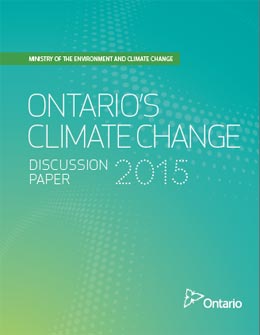
Ontario recently released a climate change discussion paper (pdf) and invites citizens, businesses and communities to share ideas about how to “successfully fight climate change while fostering economic growth and keeping our businesses competitive.”
Minister’s Message
“Climate change is the critical issue of our time. Two numbers that are vital for Ontarians to be aware of: 4, the number of degrees in this century that the planet is on track to warm by, and 6, the number, in trillions of dollars of new economic growth that will result from moving to a low-carbon economy.
A 4 degree increase in the mean temperature of our planet will have catastrophic consequences. Severe weather events are already driving up insurance costs and severely damaging our infrastructure. Food security and costs will be an early problem as climate change impacts where our food is grown and affects our water supply.
Climate change is a problem with a solution. Reducing our carbon emissions will produce a new innovation economy in Ontario. Building on our early leadership in sustainable technology and innovation, Ontario is well positioned to seize the opportunities of a low-carbon economy if we are prepared to take bold action.
Reducing our energy costs through the establishment of new building standards, and the use of new technologies, will enable us to reduce the emissions from our homes.
Moving to low-carbon and zero emission transportation options will allow us to move to and from our homes and jobs more efficiently, while improving the air we breathe and growing our manufacturing sector.
The new low-carbon economy will mean more and better jobs. It will avoid an environmental crisis and secure our future as a global green service and industrial economy leader.
We have already made great strides by eliminating coal power generation in Ontario, strengthening our building code, and beginning to electrify GO transit, but there is much more that must be done. We know we can do this and your participation in developing this strategy is essential to our success.“
Glen Murray
Minister of the Environment and Climate Change
Ontario’s Climate Change Discussion Paper 2015
http://www.downloads.ene.gov.on.ca/envision/env_reg/er/documents/2015/012-3452.pdf
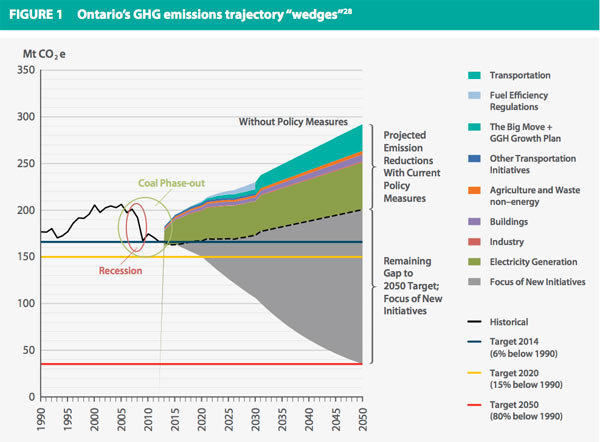
The discussion paper’s purposes are as follows.
- It identifies the climate change challenge, the risks and threats it poses to Ontario’s environment, economy and way of life.
- This discussion paper suggests actions that encourage individuals, businesses, government and communities to do more to reduce greenhouse gas emissions (GHG).
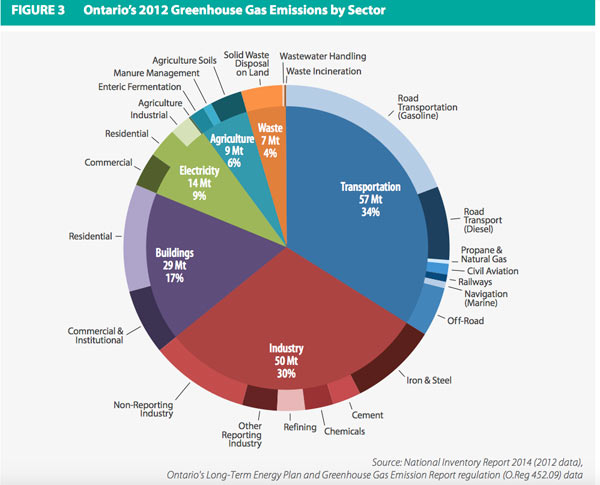
- Also, the paper presents considerations for Ontario’s approach to addressing climate change over the short and long term. “There are various tools at our disposal including carbon pricing and climate critical policy areas.”
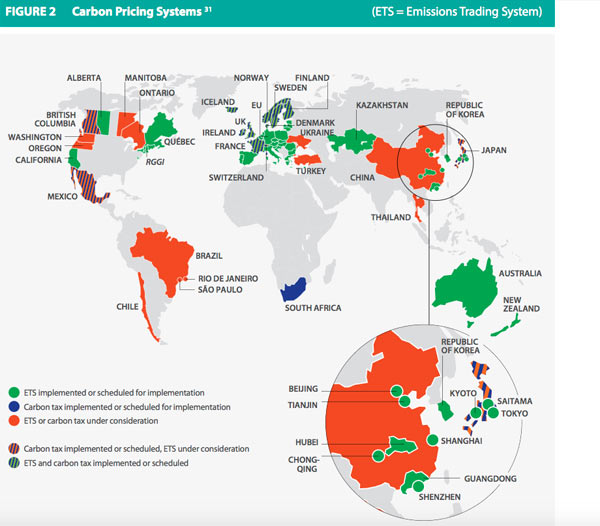
- And it asks important questions to:
- help inform a comprehensive climate change strategy and action plan, to be released later this year, and
- determine which initiatives and programs currently underway are the most effective in reducing emissions and building resilience in order for Ontario to meet its emissions targets and adaptation goals.
This discussion paper invites comments through a series of questions at the end of the paper.
- Your answers will help inform a climate change strategy and action plan to be released in 2015.
This document will be posted to the Environmental Bill of Rights for a 45 day comment period.
- This proposal has been posted for a 45 day public review and comment period starting February 12, 2015.
- If you have any questions, or would like to submit your comments, please do so by March 29, 2015 to:
- Kathy Hering
Senior Policy Analyst
Ministry of the Environment
Climate Change and Environmental Policy Division
Air Policy and Climate Change Branch
77 Wellesley Street West
Floor 10
Toronto Ontario
M7A2T5
Phone: (416) 326-8092
- Kathy Hering
- Additionally, you may submit your comments on-line at http://www.ebr.gov.on.ca/ERS-WEB-External/displaynoticecontent.do?noticeId=MTI0Mzcz&statusId=MTg3MjY0&language=en
- All comments received prior to March 29, 2015 will be considered as part of the decision-making process by the Ministry of the Environment if they are submitted in writing or electronically using the form provided in the notice at http://www.ebr.gov.on.ca/ERS-WEB-External/searchComment.do?actionType=add¬iceId=MTI0Mzcz&statusId=MTg3MjY0¬iceHeaderIdString=MTI0Mzcz and reference EBR Registry number 012-3452.
- Please Note: All comments and submissions received will become part of the public record. You will not receive a formal response to your comment, however, relevant comments received as part of the public participation process for this proposal will be considered by the decision maker for this proposal.
During and after that time, focused discussions, town halls meetings and stakeholder forums will be organized to ensure that the themes and approach are considered from a number of stakeholder perspectives.
You should consider and provide your perspective to the following questions. The questions are organized along these five themes:
- Traditional Knowledge. What are the best ways to employ the traditional knowledge of First Nations and Métis communities in the process of developing the climate change strategy and action plan, and in implementing their provisions?
- Action in key sectors such as transportation, buildings, electricity, industry and agriculture (e.g., expanded public transit, energy efficient buildings, renewable energy).
- Price on Carbon. Carbon pricing can spur clean technology research and development as emitters look for ways to reduce carbon and manage risk. Countries around the world are pricing carbon. Pricing carbon is also happening in Canada with British Columbia’s carbon tax, Alberta’s intensity-based system and Quebec’s cap and trade program, which is linked with California.
- Communities and Built Form. Redesign and build strong carbon neutral economy, communities, infrastructure and energy.
- Science and Technology. Support science, research and technology to encourage the breakthroughs, discoveries and investments needed to reduce carbon use.
The following questions “do not necessarily reflect the policy direction of the government of Ontario:”
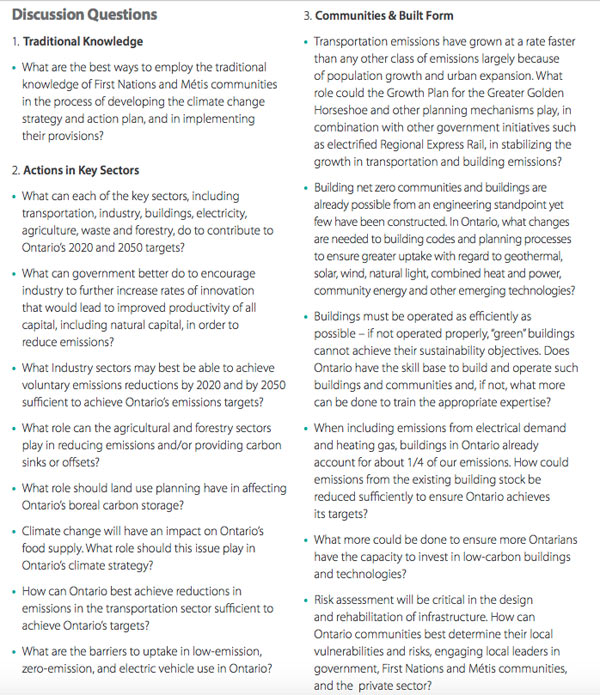
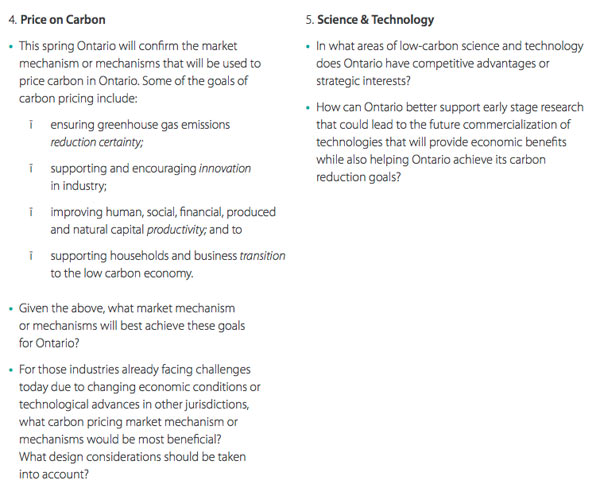
The province plans to consult with the public, stakeholders, businesses, First Nations and Métis communities, and municipalities to gather feedback on this proposed approach to climate change.
In-person consultations
Following consultations, Ontario will prepare a long-term climate change strategy and develop a 5-year action plan for release.
- Ontario will host a Climate Summit of the Americas from July 7-9, 2015, to advance collaborative action on climate change ahead of the Conference of the Parties in Paris in December.
NEWS RELEASE
Ontario Releases Climate Change Strategy Discussion Paper
Province Engaging Public, Businesses and Communities on Climate Change Strategy
February 12, 2015 10:30 A.M.
Ministry of the Environment and Climate Change
Ontario has released a climate change discussion paper and invites citizens, businesses and communities to share ideas about how to successfully fight climate change while fostering economic growth and keeping our businesses competitive.
The government will engage aboriginal communities and hold province wide consultations with citizens, community organizations, industry stakeholders, municipal representatives and businesses, and will publically post the discussion paper for comment on the Environmental Registry for 45 days. The discussion paper:
- Identifies the climate change challenge, the risks and threats it poses to Ontario’s environment, economy and way of life.
- Suggests actions that encourage individuals, businesses, government and communities to do more to reduce greenhouse gas emissions.
- Asks important questions to help inform a comprehensive climate change strategy and action plan, to be released later this year.
Engaging the public in a conversation about climate change builds on Ontario’s recent achievements including closing coal plants, curbing the use of cosmetic pesticides and protecting 1.8 million acres of land. These initiatives have resulted in fewer smog days and cleaner water.
Fighting climate change and supporting Ontario’s clean technology sector are part of the government’s economic plan for Ontario. The four part plan is building Ontario up by investing in people’s talents and skills, building new public infrastructure like roads and transit, creating a dynamic, supportive environment where business thrives, and building a secure savings plan so everyone can afford to retire.
Quick Facts
- Information about public sessions, including dates, cities and towns and venues, is available online at www.ontario.ca/climatechange.
- The site also has a quick guide to the discussion paper and several options to provide ideas and comments.
- Ontario has the fastest growing clean-tech sector in Canada, with 2,700 clean-tech firms employing 65,000 people and generating annual revenues of more than $8 billion.
- Ontario’s actions to close coal fired electricity plants, curb the use of cosmetic pesticides and protect 1.8 million acres of land have resulted in fewer smog days and cleaner water.
- Ending coal-fired power is the single largest greenhouse gas reduction initiative in North America, equivalent to taking seven million cars off the road.
- Ontario will host a Climate Summit of the Americas from July 7-9, 2015, to advance collaborative action on climate change ahead of the Conference of the Parties in Paris in December.
Background Information
Additional Resources
- Climate Change Discussion Paper
- Ontario Climate Change Update 2014
- Follow and join the conversation on Twitter with #ONclimate
Quotes
“Climate change is already costing Ontarians by threatening our communities, businesses and way of life. While Ontario is showing leadership in fighting climate change, we know we need to do more and we need to act fast. Over the next few months, we will be asking citizens about their thoughts on how to fight climate change, foster economic growth and help secure a better future for this province for generations to come.”
Glen R. Murray
Minister of the Environment and Climate Change
“We welcome Ontario’s approach of inclusive consultation on climate change policy and as a recognized North American leader in energy and GHG reduction and efficiency, GM Canada looks forward to active participation in this process.”
David Paterson
Vice President Corporate and Environmental Affairs, General Motors Canada
“It’s refreshing to see Ontario addressing climate change so directly. It’s clear that the government recognizes not only the imperative of taking action on climate change, but that doing so will make us better off. This paper is a great starting point for a critical conversation about our province’s future.”
Tim Gray
Executive Director, Environmental Defence
——————————————————–
You may also want to know:
- You’re Invited to Black History Month Events in February 2015 (Most events are FREE)
- Please Help Create the World’s Largest Marine Sanctuary in the Pacific: Petition Before Aug.11, 2014
- McAfee: Superstar Soccer Players’ Screensavers and “Skills” Video Downloads are Risky to Search for Online (McAfee’s FREE SiteAdvisor)
- You’re Invited: “Toronto Observed Through Three Generations: Photographs by Harry Joy, Doug Hemmy and Andy Brooks” Jan.24-May 9, 2015 (Opening Reception Jan.24; FREE Admissions, Toronto)
- You’re Invited: Camera Obscura at The Photographers’ Gallery (FREE admission in London, UK)
- Panasonic + UNESCO: Beautiful 2015 World Heritage Calendar App for PCs & Tablets in Five Languages (FREE App)
- Photography Copyright Kit (FREE)
- Olympus ‘Anywhere Classroom’ Video Series Starts June 26, 2014: An Online FREE Photography Class Using Olympus OM-D Cameras & Lenses
- Nikon Canada Invites Canadian Residents to Nikon Image Space: An Online Service for Sharing Photos or Recording Memories (FREE online service for all Canadian residents to share & record images: FREE two GB of storage for everyone and Nikon camera owners get an extra FREE 18 GB of storage.)
- Canon’s Cloud-based Image Management Service, irista: No Cost for Up to 15GB + New Updates are Now Live (FREE 15GB of cloud storage space with full irista functionality)
- You’re Invited to the New Leica Fotopark: A Photo Platform for Passionate Photographers to Discover, Exchange, Organise, Create [Registration on www.leica-fotopark is FREE, as is the use of the platform for data volumes of up to ten gigabytes (GB)]
- Calling Artists for Nuit Blanche 2015: Info Sessions Jan.5, 12 + Submission Deadlines Jan.19, Feb.17
- World Photography Organisation’s New 2015 Mobile Phone Award: Submit Entries by 11:59:59pm (GMT) on 27 Feb.2015 (FREE Entries)
- You’re Invited: Download Leica Fotografie International App for iPhone, iPod Touch, iPad and Android
- Scarborough Subway Project Assessment-Line 2 Extension: Public Consultations Jan.31 & Feb.2, 2015 + Online Feedback
- Celebrate: Fort York Visitor Centre (five new exhibitions is opened inside the new Visitor Centre in 2014 – 2015)
